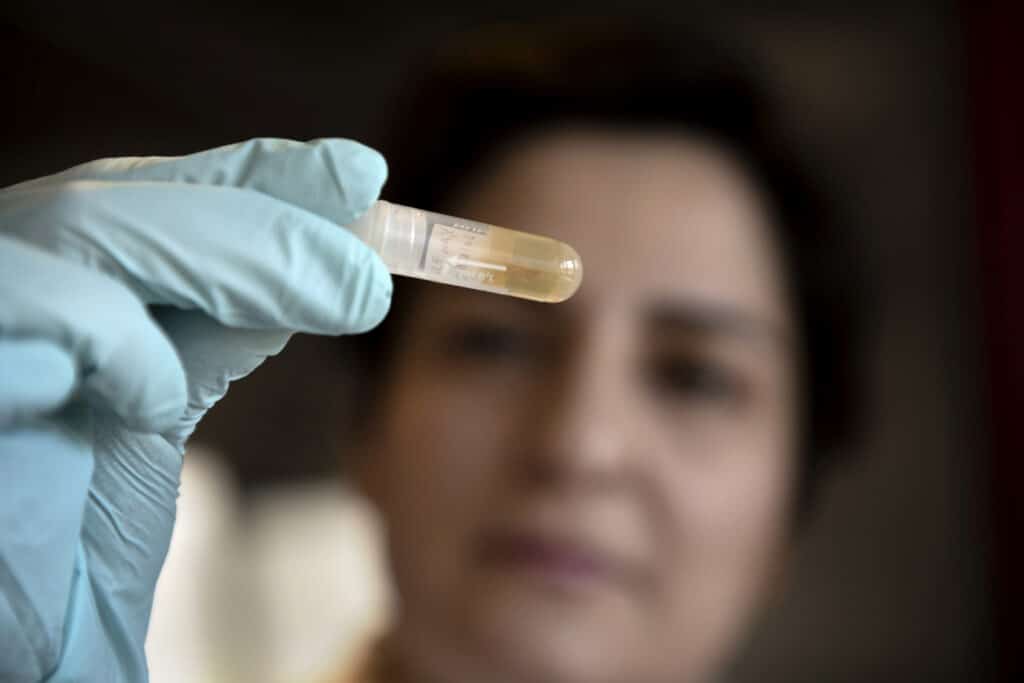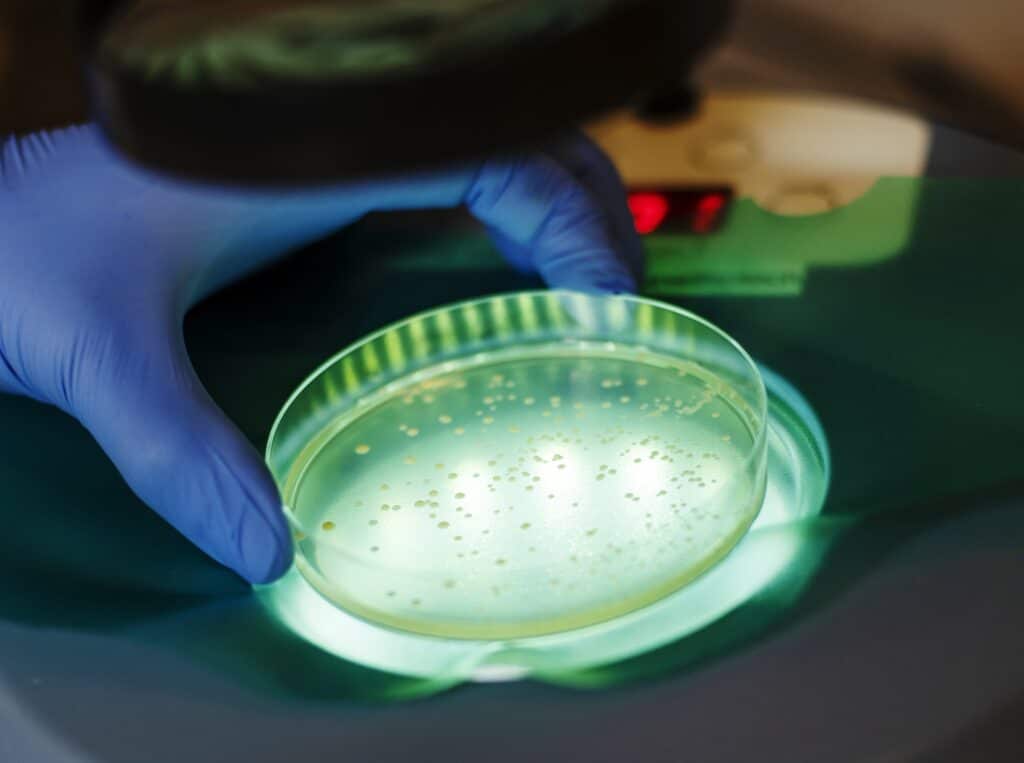Gut Microbiota
and health
Our gastrointestinal tract is home to trillions of bacteria that play a crucial role in the digestion of food and maintaining our overall health and wellbeing. However, when the harmful bacteria in our gut outnumber the beneficial ones, it leads to a state of dysbiosis, which is associated with various common and chronic illnesses, such as obesity, diabetes, functional and inflammatory bowel disorders (IBS and IBD), neurological conditions (e.g., multiple sclerosis, myalgic encephalomyelitis/chronic fatigue syndrome, autism), certain types of cancer, and mental health disorders.
A healthy gut microbiota is characterized by a diverse and thriving community of microorganisms. However, our modern lifestyle, unbalanced diet, excessive use of antibiotics, and stress can disrupt this delicate balance.
There is mounting evidence highlighting the crucial role of gut microbiota in several complex diseases, leading to the development of a new class of products and therapeutics that target the microbiome. ImmuneBiotech is among the leading players in this field.
Dysbiosis not only alters the intestinal permeability, causing a “leaky gut,” but also affects the mucosal immune system, leading to inflammation in both the local and distal areas. This disturbance in the microbiota equilibrium contributes to the pathogenesis of various diseases. ImmuneBiotech considers all these factors during the scientific screening and precision in selection and development of its probiotic products.


The gut is home to nearly 80% of our immune cells. A properly functioning gut immune system not only helps in removing harmful pathogens and pathobionts, but also respects normal resident microbes and facilitates tissue repair. However, immune system-mediated pro-inflammatory reactions to foods, allergens, microbes, and other stimuli can cause discomfort or even result in inflammatory bowel conditions.
Several studies have shown that probiotics have a positive impact on host immunity, regulating the functions of both systemic and mucosal immune cells, as well as intestinal epithelial cells. As a result, probiotics hold great potential in the treatment of various diseases, including autoimmune and immune-related disorders.
The intestinal barrier, composed of epithelial cells and a mucus layer, serves two crucial functions: regulating the uptake of nutrients and acting as a barrier to harmful substances and foreign microorganisms.
There is a constant interplay between the gut microbiota, the immune system, and the intestinal barrier. Disruptions to this delicate balance, caused by long-term stress, poor dietary habits, toxins, and overuse of antibiotics, can lead to increased intestinal permeability or “leaky gut.” This condition allows unwanted molecules and even microbes to pass into circulation, affecting local and peripheral tissues.
Leaky gut has been linked to several health issues, such as food sensitivities, allergies, skin problems, brain fog, migraines, pain, and autoimmune diseases.
The gut-brain axis is a complex network of bidirectional communication between the central nervous system and the gut, linking the emotional and cognitive centers of the brain with peripheral intestinal functions. Most famously through the Vagus nerve, this connection also includes endocrine, humoral, metabolic, and immune routes of communication.
Dysbiosis correlates strongly with chronic intestinal inflammation and leaky gut, which can manifest in intestinal diseases and brain pathologies, including neurodegenerative, neurodevelopmental, and psychiatric disorders. Consequently, targeting gut inflammatory conditions with precision probiotics represents an attractive therapeutic strategy for alleviating brain-related inflammatory and autoimmune conditions.

“I realized that it would be possible to design effective probiotic products using the same research strategies as for drug development. Instead of using small chemical molecules or antibodies, we could use safe probiotic strains.
This new approach has been highly successful, and our clinical results demonstrate how a precision probiotic approach represents a viable treatment for irritable bowel syndrome and ME/CFS, for which no effective therapies are available to patients.”
– Dr. Shahram lavasani
Choosing the right
probiotics
Imbalances resulting from gut health disruptions require intervention to restore equilibrium. While the health benefits of consuming fermented foods have been recognized since ancient times, modern scientific tools enable precise selection and combination of beneficial microbes to achieve specific health outcomes. Choosing the right probiotics means relying on scientific and clinical evidence that demonstrates the live bacterial culture can safely and effectively:


ImmuneBiotics®
Next-generation probiotics
ImmuneBiotics are precision-designed probiotics that work to restore balance between the gut microbiome, the immune system, and the intestinal barrier, providing several interrelated health benefits, including:

Each ImmuneBiotics product is specifically formulated to address a specific condition, such as IBS, ME/CFS, or CDI.


Our Platform
Lactobacilli are commensal bacteria that play a crucial role in maintaining the balance of intestinal flora. Certain strains of Lactobacillus species can promote health, hence the name “probiotics”. The health benefits of lactobacilli are attributed to their ability to modulate the microbiota composition, immune system, and gut-brain axis. However, not all lactobacilli behave in the same manner, and there are significant differences between strains. Therefore, disease-specific probiotic selection is crucial to achieving the desired health effect.
Our proprietary collection of 150 unique and qualified lactobacilli strains are isolated from natural, healthy food sources. Unlike many other probiotics, these strains are not derived from feces. This exclusive library serves as a starting point for selecting the appropriate multi-strain probiotic combination to achieve therapeutic effects. All strains can be used as food supplements without further safety evaluation, as they are included in EFSA’s (European Food Safety Authority) list of safe bacteria.
ImmuneBiotech is built upon a strong scientific foundation, with over 20 years of research in the fields of immunology, inflammation, microbiology, gut-brain axis, and microbiome. The company has developed and established multiple scientific methods and know-how to screen and design bacterial consortia with the aim of restoring several critical disease-related pathological alterations, including dysbiosis in the microbiota, gut barrier dysfunction, and intestinal/systemic inflammation.
Our pharmaceutical-inspired screening platform sets us apart from any other probiotic producer. The stepwise approach to probiotic development is based on:
1. Proprietary strain library sourced from healthy foods:
We select appropriate multi-strain combinations from our proprietary collection of probiotic strains to address a health need.
2. In vitro screening:
Selected consortia are screened using several in vitro assays to prioritize candidates that satisfy appropriate biological activities.
3. Preclinical efficacy:
Lead consortia are tested in models of the gastrointestinal, neurological, or inflammatory condition.
4. Manufacturing:
Careful choice of sustainable and experienced manufacturer.
Probiotic powder is produced and fit into advanced, acid-resistant, and vegan-friendly capsules.
5. Human clinical trials:
Products are evaluated for safety and efficacy in pilot or placebo-controlled human studies with investigators at our partner institutions.


Pipeline
We are developing selected consortia designed as combination therapy with existing drugs to improve efficacy and reduce side effects. The initial focus will be on microbiome-linked autoimmune disorders with high unmet therapeutic needs.


